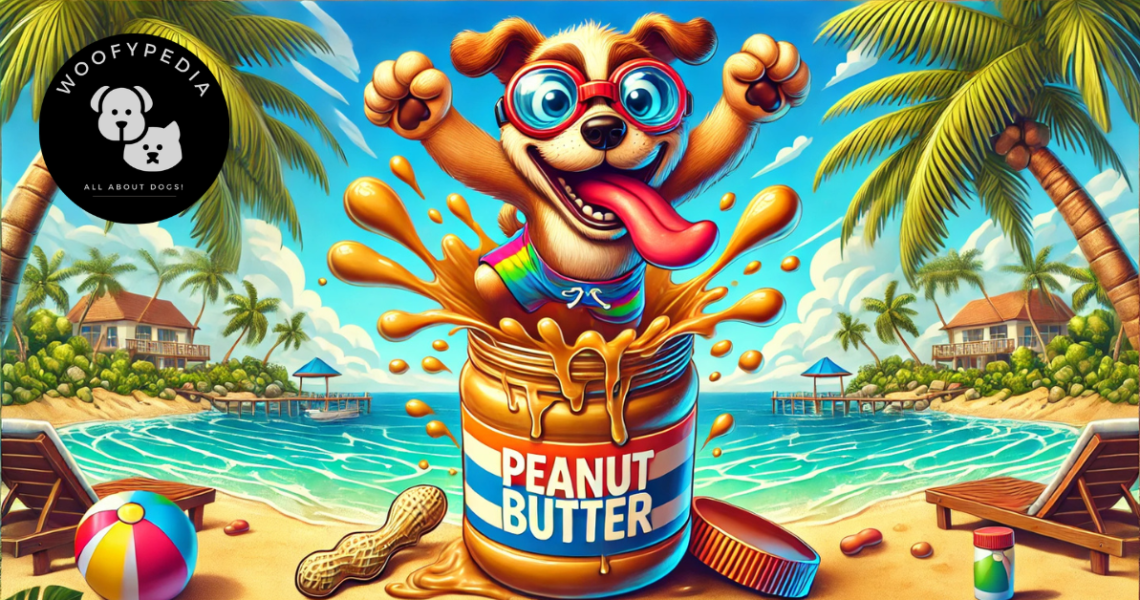Can Dogs Eat Peanut Butter? All You Need to Know!
Table of Contents
- Can Dogs Eat Peanut Butter?
- Is Peanut Butter Safe for Dogs?
- Benefits of Peanut Butter for Dogs
- What Peanut Butter is Safe for Dogs?
- Can Dogs Eat Peanuts or Other Types of Nuts?
- How Much Peanut Butter Can Dogs Eat?
- Can Dogs Be Allergic to Peanut Butter?
- Fun and Safe Ways to Feed Peanut Butter to Dogs
- Frequently Asked Questions
- Conclusion
- Fun Facts: Q&A About Peanut Butter for Dogs
Peanut butter is a delicious and versatile treat loved by humans, but can our furry companions enjoy it too? Many dog owners wonder, “Is peanut butter good for dogs?” or “Is peanut butter bad for dogs?” This is a common question among pet parents who want to treat their dogs without compromising their health.
Can Dogs Eat Peanut Butter?
Yes, dogs can eat peanut butter! The good news is that peanut butter can be a safe and tasty snack for dogs when given in moderation and prepared correctly. When choosing peanut butter for your dog, make sure it is free from xylitol, a sugar substitute that is highly toxic to dogs. Additionally, opt for natural peanut butter with low sugar and salt to ensure your furry friend stays healthy and happy.
Is Peanut Butter Safe for Dogs?
Yes, peanut butter is generally safe for dogs to eat. However, not all peanut butter is created equal. When selecting peanut butter for your dog, you must avoid any brands that contain harmful ingredients such as xylitol, a sugar substitute that is extremely toxic to dogs. Even a small amount of xylitol can cause severe health problems, including low blood sugar, liver failure, and in some cases, death.
Additionally, peanut butter that contains excessive sugar or salt can be unhealthy for dogs. Opt for natural, unsweetened peanut butter to ensure your dog’s safety and health.
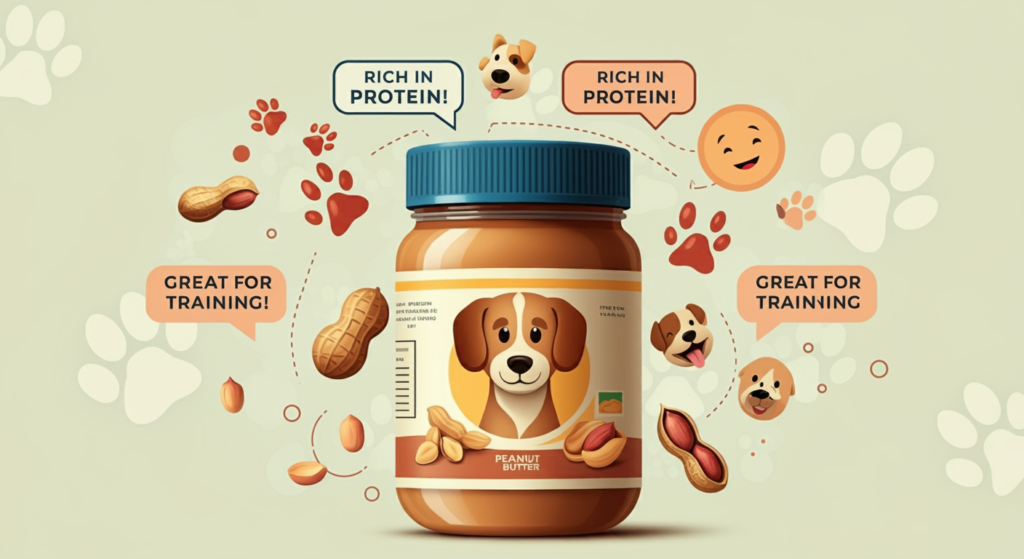
Benefits of Peanut Butter for Dogs
Peanut butter can be a nutritious and enjoyable treat for dogs when fed appropriately. Here’s a breakdown of its key benefits:
1. Rich in Protein
- Peanut butter is a great source of protein, which is vital for building and maintaining muscle mass in dogs. Protein also plays a key role in supporting healthy skin, nails, and fur.
- Dogs that receive sufficient protein are more likely to have increased energy levels and better overall health.
2. Healthy Fats
- Peanut butter contains monounsaturated fats, which provide a steady source of energy and help maintain a glossy, healthy coat.
- These fats also contribute to brain health and the proper absorption of fat-soluble vitamins like A, D, E, and K.
3. Vitamins and Minerals
- Vitamin B: Helps with energy production, nervous system function, and red blood cell formation.
- Vitamin E: Acts as an antioxidant, protecting cells from damage and supporting the immune system.
- Niacin (Vitamin B3): Improves circulation and supports skin health.
4. Nutritional Composition
To better understand the benefits, here’s a quick snapshot of the nutrients found in a standard tablespoon (15g) of natural peanut butter:
| Nutrient | Amount per 15g | Benefits for Dogs |
|---|---|---|
| Calories | ~90 kcal | Provides a source of energy for active dogs. |
| Protein | ~3.5g | Supports muscle development and repair. |
| Total Fat | ~8g | Promotes a shiny coat and energy storage. |
| Fiber | ~1g | Aids digestion and maintains gut health. |
| Vitamin E | ~1.5mg | Boosts immunity and protects cell health. |
| Niacin (B3) | ~1.2mg | Supports healthy skin and circulation. |
Note: Nutritional values may vary slightly based on the brand and ingredients used.
5. A Multi-Purpose Treat
Not only is peanut butter nutritious, but it is also a practical and versatile tool for dog owners:
- Training Aid: Many dogs find peanut butter irresistible, making it an effective reward for good behaviour.
- Medication Helper: Use peanut butter to coat pills and make medication time less stressful.
- Enrichment Treat: Spread peanut butter inside toys like Kongs to keep your dog entertained and mentally stimulated.
By incorporating small amounts of natural peanut butter into your dog’s diet, you can provide both a nutritious snack and a valuable training tool. However, moderation is key to ensuring your dog enjoys these benefits without overindulging.
What Peanut Butter is Safe for Dogs?
Not all peanut butter is suitable for dogs. Here’s what to look for when choosing a safe option:
- No Xylitol: Avoid any brands that list xylitol as an ingredient. It’s one of the most dangerous substances for dogs.
- Low Sugar and Salt: Too much sugar or salt can lead to obesity, high blood pressure, or other health problems in dogs.
- Natural Options: Choose unsweetened, natural peanut butter with minimal ingredients. Look for products that only contain peanuts or peanuts and a small amount of oil.
If you’re unsure which brands to choose, consider trying dog-specific peanut butter products designed to be safe and healthy for pets. (Check out our recommendations in the affiliate links below!)
Can Dogs Eat Peanuts or Other Types of Nuts?
Dogs can eat some types of nuts in moderation, but not all nuts are safe for them. While peanuts are among the safer options, it’s essential to consider the type of nut, its preparation, and potential risks. Here’s a detailed look at the suitability of peanuts and other common nuts for dogs:
Peanuts
- Can dogs eat peanuts?
Yes, plain, unsalted peanuts are generally safe for dogs to eat in moderation. They are a good source of protein, healthy fats, and vitamins such as niacin (Vitamin B3). - Are peanuts bad for dogs?
Peanuts themselves are not harmful, but the way they are prepared can make them unsuitable. Avoid salted, flavoured, or roasted peanuts, as added seasonings or oils can lead to digestive upset or even long-term health problems such as obesity and high blood pressure. - Should dogs eat peanuts?
Moderation is key. While peanuts offer nutritional benefits, they are high in fat and calories, which can lead to weight gain or pancreatitis if overfed. Limit treats containing peanuts to occasional rewards.
Groundnuts (Another Term for Peanuts)
Groundnuts, a term often used to refer to peanuts, are safe for dogs when plain and unsalted. The same guidelines for peanuts apply to groundnuts—feed sparingly and avoid processed varieties.
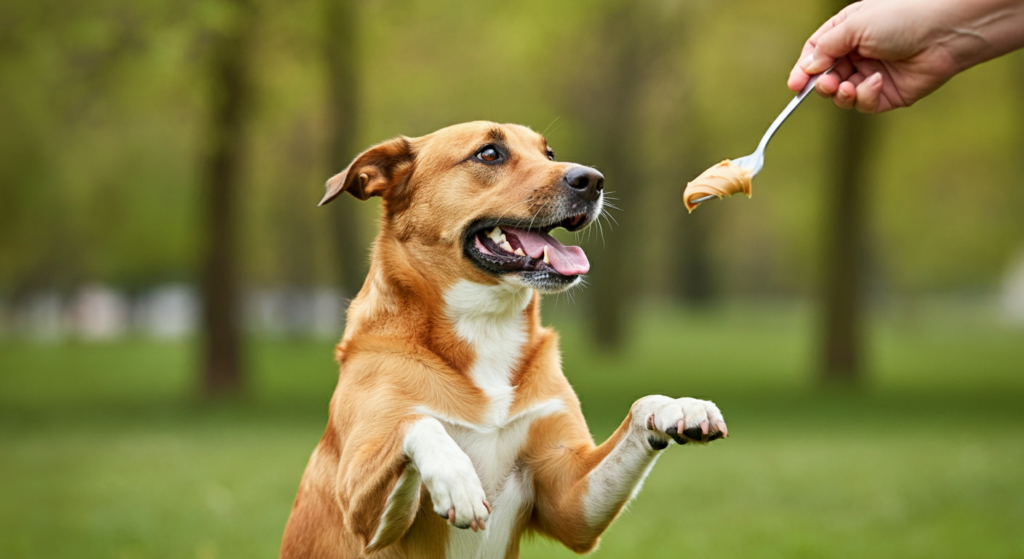
Cashew Nuts
- Can dogs eat cashew nuts?
Yes, dogs can eat cashews in moderation. They are rich in healthy fats and minerals like magnesium, calcium, and iron. However:- Cashews are high in fat, which can contribute to weight gain if overfed.
- Avoid cashews that are salted or seasoned.
- Suitability:
Cashews can be offered as an occasional treat but should not be a regular part of a dog’s diet due to their calorie density.
Almonds
- Can dogs eat almonds?
No, almonds are not recommended for dogs. While not toxic, they can pose a choking hazard, especially for smaller dogs. Almonds are also difficult for dogs to digest and may cause gastrointestinal upset. - Suitability:
Avoid almonds, as they offer little nutritional value for dogs and can lead to blockages or digestive issues.
Walnuts
- Can dogs eat walnuts?
No, walnuts are not safe for dogs. English walnuts, in particular, are prone to mould contamination, which can produce mycotoxins harmful to dogs. Black walnuts are highly toxic and can cause severe symptoms like vomiting, tremors, and seizures. - Suitability:
Do not feed walnuts to dogs under any circumstances.
Brazil Nuts
- Can dogs eat Brazil nuts?
Brazil nuts are not toxic to dogs but are not recommended. They are extremely high in fat and calories, making them difficult for dogs to digest and increasing the risk of obesity or pancreatitis. - Suitability:
Avoid Brazil nuts, as the risks outweigh the benefits.
Pine Nuts
- Can dogs eat pine nuts?
Yes, but only in very small quantities. Pine nuts are not toxic but are high in fat, which can upset a dog’s stomach and contribute to weight gain if overfed. - Suitability:
Pine nuts can be given occasionally in very small amounts but are not ideal as a regular treat.
Nuts That Are Toxic to Dogs
While some nuts like peanuts and cashews are safe in moderation, others are highly toxic and must be avoided:
- Macadamia Nuts: Extremely toxic to dogs and can cause vomiting, weakness, tremors, and hyperthermia, even in small amounts.
- Walnuts (Black Walnuts): Contain compounds that are toxic to dogs and can lead to neurological symptoms and digestive issues.
Key Takeaways: Which Nuts Are Safe for Dogs?
| Nut Type | Safe for Dogs? | Notes |
|---|---|---|
| Peanuts | Yes, in moderation | Avoid salted, roasted, or flavoured peanuts. |
| Cashews | Yes, sparingly | High in fat—limit to occasional treats. |
| Almonds | No | Can cause choking or digestive issues; offers little nutritional value. |
| Walnuts | No | Can be mouldy and toxic; black walnuts are especially dangerous. |
| Brazil Nuts | No | Extremely high in fat; best avoided. |
| Pine Nuts | Yes, in small amounts | Not toxic but high in fat; feed sparingly. |
| Macadamia Nuts | No | Highly toxic; never feed to dogs. |
While peanuts and some other nuts like cashews and pine nuts are safe for dogs in moderation, many nuts are either unsuitable or outright toxic. Always choose plain, unsalted varieties of safe nuts, and avoid feeding dogs nuts that are difficult to digest, high in fat, or potentially toxic. As with any treat, moderation is critical to keeping your dog healthy and happy. When in doubt, consult your veterinarian before introducing new foods into your dog’s diet.
How Much Peanut Butter Can Dogs Eat?
Portion control is essential when feeding your dog peanut butter. Too much can lead to obesity, digestive problems, or even pancreatitis. Here’s a general guideline:
- Small Dogs: ½ teaspoon per day.
- Medium Dogs: 1 teaspoon per day.
- Large Dogs: Up to 1 tablespoon per day.
These amounts are approximate and depend on your dog’s overall diet and activity level. Always consult your vet for personalized advice.
Can Dogs Be Allergic to Peanut Butter?
While peanut allergies are rare in dogs, they can occur. Symptoms of a peanut butter allergy include:
- Vomiting or diarrhoea.
- Itching or skin irritation.
- Swelling of the face or paws.
- Difficulty breathing (in severe cases).
If you notice any of these symptoms after feeding your dog peanut butter, stop immediately and contact your vet.
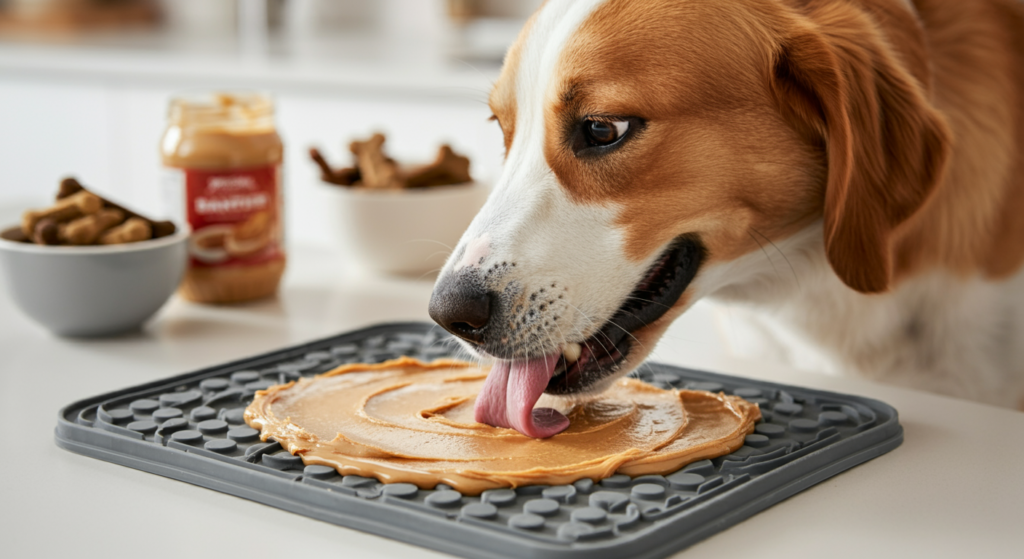
Fun and Safe Ways to Feed Peanut Butter to Dogs
Peanut butter isn’t just a delicious snack for dogs—it’s also a versatile treat that can provide mental stimulation, enrichment, and bonding opportunities. Below are some creative and safe ways to incorporate peanut butter into your dog’s routine:
1. Fill a Kong Toy or Puzzle Feeder
- Spread a small amount of peanut butter inside a Kong or similar puzzle toy. This encourages your dog to work for their treat, providing mental stimulation and preventing boredom.
- For added enrichment, freeze the toy after filling it with peanut butter to make it last longer and keep your dog entertained.
2. Frozen Peanut Butter Treats
- Freeze small dollops of peanut butter on a baking sheet lined with parchment paper to create quick, cooling snacks.
- Alternatively, mix peanut butter with plain, unsweetened yogurt and freeze the mixture in ice cube trays for a refreshing summer treat. These are especially helpful on hot days to keep your dog cool.
3. Homemade Peanut Butter Dog Treats
Making your own treats at home ensures they are free from harmful ingredients and tailored to your dog’s preferences. Here’s a simple recipe you can try:
DIY Peanut Butter Dog Treat Recipe
- Ingredients:
- 1 cup of natural peanut butter (without xylitol)
- 1 cup of whole wheat flour
- ½ cup of water
- Optional: 1 mashed banana or 1 tablespoon of honey for added flavour.
Instructions:
- Preheat your oven to 175°C (350°F).
- In a mixing bowl, combine the peanut butter, flour, and water until a dough forms. Add the banana or honey if desired.
- Roll out the dough on a floured surface and cut it into fun shapes using cookie cutters.
- Place the shapes on a lined baking sheet and bake for 20 minutes, or until firm and lightly golden.
- Let the treats cool completely before serving. Store in an airtight container for up to a week.
4. Stuffed Fruits and Vegetables
- Spread a thin layer of peanut butter on dog-safe fruits like apple slices (ensure seeds are removed) or stuff it inside hollow vegetables like celery or a bell pepper. This is a nutritious way to combine peanut butter with other healthy foods your dog can enjoy.
5. Layered Lick Mats
- Use a lick mat to spread peanut butter thinly across its surface. Lick mats are designed to keep your dog engaged and calm, and the repetitive licking can even help reduce anxiety.
- For variety, you can layer the peanut butter with other dog-safe ingredients like mashed pumpkin, plain yogurt, or pureed sweet potato.
6. Peanut Butter Training Treats
- Use small amounts of peanut butter as a high-value reward during training sessions. Its rich aroma and taste make it an irresistible motivator for many dogs.
7. Hide Medication
- Coat your dog’s pills or tablets with a small amount of peanut butter to make medication time stress-free. Most dogs will happily eat their medicine when it’s disguised in their favourite treat.
Important Tips for Feeding Peanut Butter Safely
- Always choose natural peanut butter free from harmful ingredients like xylitol, salt, and added sugar.
- Use peanut butter in moderation to avoid overfeeding and potential weight gain.
- Monitor your dog for any signs of allergy or intolerance, such as vomiting, diarrhea, or itching.
By incorporating these fun and safe methods, peanut butter can become more than just a snack—it can be a way to bond with your dog, provide mental stimulation, and support their overall well-being.
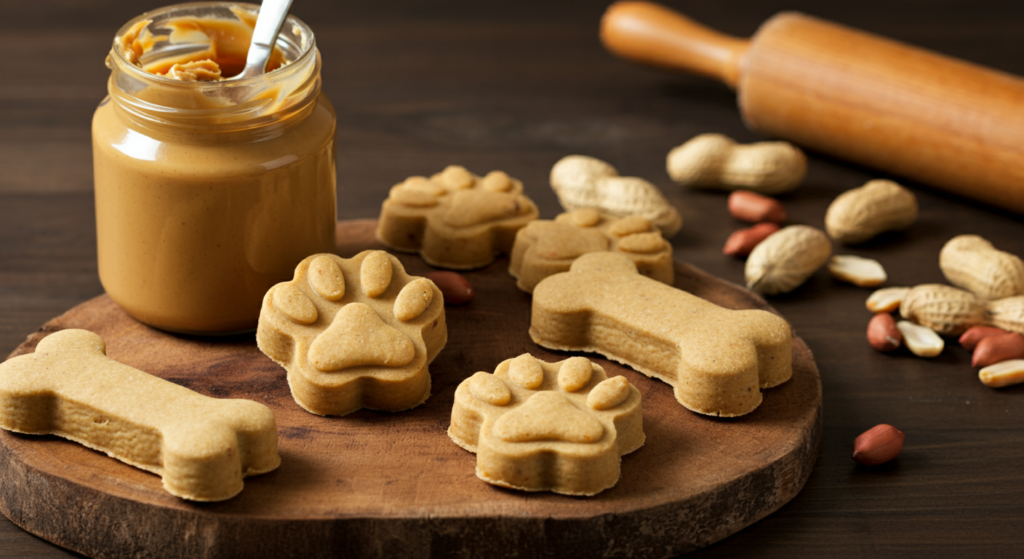
Frequently Asked Questions
Can puppies have peanut butter?
Yes, puppies can enjoy peanut butter in moderation as long as it is free from harmful ingredients like xylitol. Start with small amounts to ensure they tolerate it well.
Can a dog eat a peanut?
Yes, dogs can eat plain, unsalted peanuts, but they should be given sparingly.
What if my dog eats peanut butter with xylitol?
Contact your vet immediately. Xylitol poisoning can be life-threatening, and prompt treatment is crucial.
Is peanut butter bad for dogs?
Peanut butter is not bad for dogs when it is free of harmful ingredients and given in moderation. However, overfeeding can lead to health problems.
Conclusion
Peanut butter can be a fantastic treat for dogs when fed responsibly. It’s important to choose the right type of peanut butter, avoid harmful ingredients like xylitol, and stick to appropriate portion sizes. Whether you use it as a reward, a boredom buster, or a way to hide medications, peanut butter can be a safe and enjoyable addition to your dog’s diet.
Remember to always consult your vet if you have concerns about introducing new foods to your pet. Share this article with fellow dog owners and check out our recommended dog-safe peanut butter products below!
Fun Facts: Q&A About Peanut Butter for Dogs
Q: Which peanut butter is safe for dogs?
A: Natural peanut butter that is free from xylitol, added sugar, salt, and artificial ingredients is safe for dogs. Look for labels that list only peanuts (and possibly a small amount of oil) as ingredients.
Q: Which peanut butter has xylitol?
A: Xylitol is typically found in some sugar-free or diet peanut butter brands. Always check the ingredients list for xylitol—it is highly toxic to dogs and must be avoided.
Q: Can I give my dog human peanut butter?
A: Yes, you can give your dog human peanut butter as long as it does not contain xylitol, added sugars, salt, or harmful oils. Natural, unsweetened peanut butter is the best option.
Q: Is Tesco peanut butter safe for dogs?
A: Some Tesco peanut butter varieties may be safe, but you must carefully read the ingredients list to ensure there is no xylitol or added sugar. Stick to Tesco’s natural or organic options for safety.
Q: Which supermarket peanut butter is safe for dogs?
A: Many UK supermarkets offer natural peanut butter brands that are safe for dogs, such as Meridian or Whole Earth. Always verify the absence of xylitol, sugar, and salt in the product.
Q: What is the difference between dog peanut butter and regular peanut butter?
A: Dog-specific peanut butter is made without harmful ingredients like xylitol, sugar, or salt and may include added vitamins or flavours that are safe for dogs. Regular peanut butter can be safe if it is natural and free from additives.
Q: Can peanut butter upset dogs’ tummy?
A: Yes, peanut butter can cause stomach upset if given in large quantities, or if the dog has a sensitive stomach or allergies. Always introduce peanut butter slowly and in moderation.
Q: What brands of peanut butter contain xylitol in the UK?
A: Some “sugar-free” or “reduced-calorie” peanut butter brands may contain xylitol. It’s best to avoid peanut butter marketed as sugar-free. Always check ingredient labels, as formulations can change.
Q: Is palm oil in peanut butter ok for dogs?
A: Small amounts of palm oil are generally not toxic to dogs, but it can cause gastrointestinal upset in larger quantities. It’s best to avoid peanut butter with palm oil and opt for brands with minimal ingredients.
Q: Is Asda peanut butter OK for dogs?
A: Asda’s natural peanut butter can be safe for dogs as long as it does not contain xylitol, added sugars, or salt. Always verify the ingredient list.
Q: What peanut butter is not safe for dogs?
A: Peanut butter with xylitol, added sugar, salt, artificial flavours, or oils is not safe for dogs. Avoid “light” or “diet” varieties marketed for humans.
Q: Why is my dog acting weird after eating peanut butter?
A: Your dog may be reacting to an ingredient in the peanut butter, such as xylitol or excessive salt, or they could have an allergy or intolerance. Consult your vet immediately if your dog shows unusual behaviour.
Q: Is peanut butter a laxative for dogs?
A: Peanut butter is not typically a laxative, but excessive amounts can lead to loose stools or diarrhea due to its fat content.
Q: Can peanut butter trigger pancreatitis in dogs?
A: Yes, overfeeding peanut butter (especially varieties high in fat) can contribute to pancreatitis, a painful and potentially serious condition.
Q: How much peanut butter can I give my dog?
A: Small amounts are best. A teaspoon for small dogs or a tablespoon for larger dogs is a safe guideline. Treats, including peanut butter, should not make up more than 10% of your dog’s daily caloric intake.
Q: Can dogs get sick off peanut butter?
A: Yes, if the peanut butter contains harmful ingredients like xylitol or if it is overfed, leading to digestive issues or pancreatitis.
Q: How quickly will a dog react to peanut butter?
A: Reactions to peanut butter (e.g., an allergic reaction or xylitol poisoning) can occur within minutes to hours. Symptoms like vomiting, lethargy, or shaking should be treated as emergencies.
Q: Why do dogs lick their legs after eating peanut butter?
A: This behaviour may indicate a mild allergic reaction or discomfort. Licking can also be a soothing action if something feels off internally.
Q: Can peanut butter cause liver failure in dogs?
A: Peanut butter itself does not cause liver failure, but xylitol in certain peanut butter brands can lead to severe liver damage in dogs.
Q: What brand of peanut butter is safe for dogs?
A: Safe brands include Whole Earth, Meridian, and dog-specific peanut butter like Nuts for Pets or Doggylicious (ensure no xylitol or added salt).
Q: What happens if a dog licks peanut butter?
A: If the peanut butter is safe and given in moderation, your dog will likely enjoy it as a treat. However, monitor your dog for signs of intolerance or overconsumption.
Q: Why does my dog throw up after eating peanut butter?
A: Vomiting may occur if the peanut butter contains harmful ingredients, if your dog is allergic, or if they consumed too much. Contact your vet for advice.
Q: Why is my dog shaking after eating peanut butter?
A: Shaking could be a symptom of xylitol poisoning or a severe allergic reaction. Seek veterinary help immediately.
Q: What is your dog trying to warn about when they lick their paws?
A: Paw licking can indicate allergies, which may be triggered by an ingredient in peanut butter. It can also be a sign of stress or discomfort.
Q: What happens if I give my dog peanut butter every day?
A: Feeding peanut butter daily in moderation can be safe, but overfeeding may lead to weight gain or pancreatitis. Balance it with a healthy diet.
Q: Why do dogs go crazy for peanut butter?
A: Dogs love peanut butter because of its rich, salty-sweet flavour and creamy texture. It also has a strong aroma that dogs find irresistible.
Disclaimer: Check with Your Vet
While peanut butter can be a safe and enjoyable treat for many dogs, every pet is unique. Always check with your veterinarian before introducing new foods to your dog’s diet, especially if they have allergies, sensitivities, or existing health conditions. The information in this article is for general guidance and should not replace professional veterinary advice.
